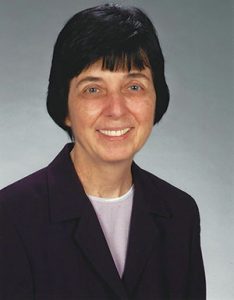 Over the course of five years of graduate study, Terry Hynes learned a lot at UW–Madison, but three lessons stand out. The faculty, she said, embodied principles that make great leaders:
Over the course of five years of graduate study, Terry Hynes learned a lot at UW–Madison, but three lessons stand out. The faculty, she said, embodied principles that make great leaders:
- excellence as scholars
- empathy as teachers
- compassion as human beings
Hynes credits her time at the UW for launching her life in academic leadership — a path that took her to California, Nebraska, and Florida, working as a professor and administrator. As she reached the end of her career, she found that she felt a debt to UW–Madison and to the teachers and colleagues who put her on the path to success.
“After I retired and focused on how much of my lucky life I owe to UW–Madison,” she says, “I began to explore concretely how I could give back, even though I am not a wealthy prospect by today’s standards.”
Hynes found the UW almost by accident. She was an undergraduate studying English and intellectual history in Massachusetts, when a professor called her attention to Wisconsin. The teacher “brightened every time Madison came up in conversation,” Hynes says, and she decided it would be a good choice for grad school. “I may have been hoping that, if I worked hard enough as a student, some of the UW faculty’s brilliance would rub off on me.”
Hynes arrived in the summer of 1970, after Madison was shaken by the Sterling Hall bombing that had killed a researcher. She began her grad program in English, earning a master’s degree, before entering a doctoral program in journalism and mass communications. Professors Bud Nelson, MaryAnn Yodelis-Smith, Doug Jones, Wilmott “Rags” Ragsdale, Dave Clark, and Walter Rideout helped to guide her education, but so did her fellow graduate students, with whom she discussed major issues of the day, including the expanding Watergate scandal — which was not only of political interest, but professional as well, as it highlighted the role of investigative journalism in the national conversation.
“It was an inspiring time to be in the J-School,” Hynes says. “One of my cohort of grad students, Carolyn Stewart Dyer [MA’73, PhD’78], worked for several years on a newspaper before returning to school for graduate study. Each day she came into the Vilas Hall office several of us shared … with a newspaper in her hand. If she had a scowl on her face, I knew she had a major insight into the emerging Watergate revelations. All of us would jump into the conversation from there.”
Hynes’s professors and colleagues inspired her to pursue a career in academia. Beginning at California State University at Fullerton, she took positions of increasing importance at the University of Florida and the University of Nebraska–Omaha, moving from professor to department chair, dean, assistant vice president, and retiring from UNO as senior vice chancellor for academic and student affairs.
“As a result of my education at UW–Madison,” she says, “I wanted to live my life in a way that would make at least some small difference — for the better — in this world. University teaching and administration provided me a lifetime of opportunities to do just that.”
Though she never attained a great fortune, Hynes feels that she’s lived a truly fortunate life, and so she wants to give back to the university that launched her career.
“I wanted to find a meaningful way to say thank you to UW–Madison and, by implication, the long line of administrators, faculty, staff, and other students to whom I am grateful for the wonderful learning experiences I had as a student,” Hynes says.
Hynes first designated a portion of her estate to UW–Madison, and then made the intention concrete by adding an annuity.
“After that, I kept thinking about how lucky I am to have enough to live relatively comfortably at this stage of life,” she says. “I realized I could give now from my IRA directly to the university and see a leadership fund started with awards made from the fund while I’m living. My experience in Madison enabled me to serve as a leader throughout much of my career, so this leadership fund will receive a major portion of my estate once I’m gone.”
The three gifts constitute Hynes’s personal thank-you note to UW–Madison’s faculty. “During my five years as a UW student, I never had a professor I did not like,” she says. “Each of them was so knowledgeable, … and most of them made me feel I had something to offer, too.”
